Freedom of Love: When forbidden love is a catalyst for change
The subject of this week's #FreedomFriday, a weekly Steemit challenge set by @eaglespirit, is Freedom of Love.
As the daughter of a "mixed marriage" this is a subject I've often thought about. It seems to me that not only can love overcome boundaries of race, class and all kinds of challenges… it's almost as if that is one of its main functions!
When we fall passionately in love, we have a tendency to overlook other things. Love has caused people to cross continents, to give up inheritances, even to risk death.
It drives people to leave their homes, disrupt their lives and to endure the pain of childbirth.
I love the novels of the 19th century author Anthony Trollope. The restrictions of women to choose their own life partners is a constant theme of his work.
Kings have given up their thrones for love. The most famous example in recent times is Edward VIII and Mrs Simpson. But there was another, more recent king who gave up his throne for love, and this story is not so well known.
The King who gave up his crown for love
Seretse Khama was the Chief of Bechuanaland, a British Protectorate in southern Africa.
A Protectorate is a dependent territory that has local autonomy. During the British Empire, Protectorates were often established to keep other colonising powers away from colonies that were distant from the centre of empire, without having to spend Treasury finances on government and infrastructure.
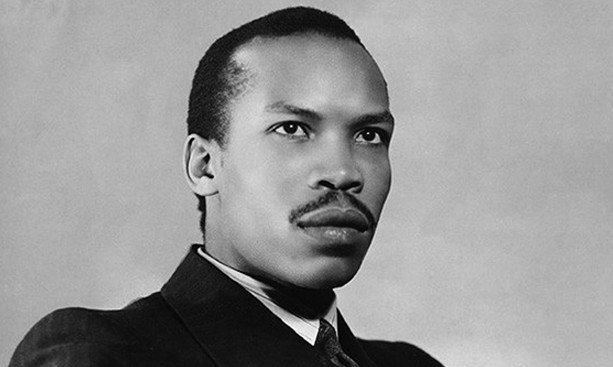
Seretse Khama (pictured right) was born in 1920. His father died in 1924, leaving the four-year-old boy to become kgosi – king, or chief – of the Bamangwato people, with his uncle as Protector.
In 1945, Khama travelled to England, to study at Balliol College, Oxford, before joining the Inner Temple in London, to study to become a barrister. It was there that he met Ruth Williams, a typist at Lloyd's of London. They were introduced by Ruth's sister, Muriel, at a London Missionary Society event. Muriel said:
"They clicked from the word go. You get this attraction – it's impossible to describe, but it's just there. It was amazing how they had so much in common with such different backgrounds."
The couple decided to marry, despite strong oppostion from the British authorities and from Khama's uncle Tshekedi Khama, the regent.
Bechuanaland shared a border with South Africa, which was a former British colony.
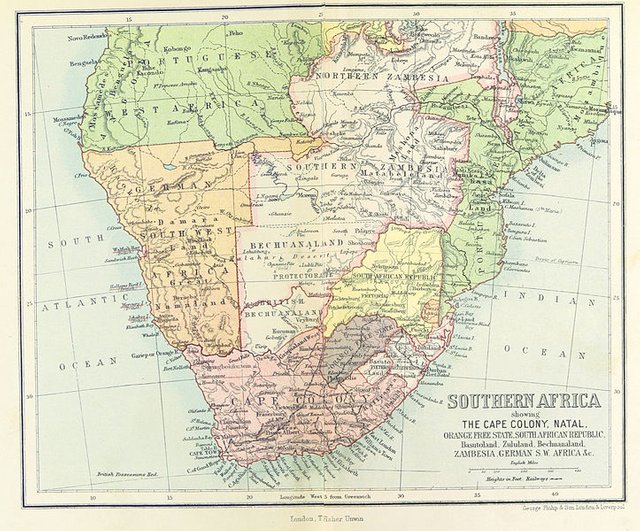
Source
South Africa lobbied the British Government to have Khama removed from the chieftainship. The British Labour-led government was not willing to risk its economic ties with South Africa. It ordered a parliamentary enquiry into Khama's fitness for the chieftainship.
Exile
The enquiry ruled that Khama was indeed fit to rule the Bamangwato, "but for his unfortunate marriage". The report was suppressed, and in 1951, Khama and his wife were exiled from Bechuanaland.
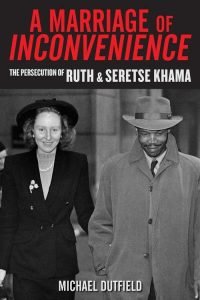
There were protests in Britain and in Bechuanaland against the decision to exile the couple, and when the British High Commission ordered the Bamangwato people to replace Khama as chief, the people refused.
In 1956, the Khamas were allowed to return to Bechuanaland – on condition that Seretse Khama renounced the chieftainship. After trying his hand as a cattle rancher, Khama became involved in local politics, and in 1957 he was elected to the tribal council.
In 1961 Khama founded the Bechuanaland Democratic Party, becoming Prime Minister of Bechuanaland in 1965.
A year later, Bechuanaland won its independence, with the newly independent country being named Botswana, and Seretse Khama as its first President.
Queen Elizabeth appointed Khama Knight Commander of the Most Excellent Order of the British Empire.
These events were covered in the excellent film A United Kingdom in 2016.
An economic miracle
One thing that interests me is how different Botswana's first steps as a newly independent nation were from most other African nations.
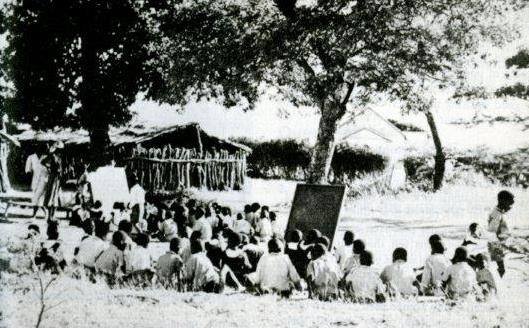
Source A mission school
According to Wikipedia, when Botswana won independence, in 1966, "it was the world's third-poorest country, poorer than most other African countries. Its infrastructure was minimal, and few of its people had formal education. There were only 22 university graduates and 100 secondary school graduates.
Seretse Khama set out on a vigorous economic programme intended to transform the nation into an export-based economy.
In 1967, diamonds were discovered in Orapa, Botswana.
Khama instituted strong measures against corruption. His administration adopted market-friendly policies to foster economic development. Khama promised low and stable taxes to mining companies, liberalized trade, and increased personal freedoms. He maintained low marginal income tax rates to deter tax evasion and corruption. He upheld liberal democracy and non-racism. He embraced the rule of law.
Between 1966 and 1980, Botswana had the fastest-growing economy in the world.

Source Centre of Botswana's capital city, Gaborone
By the mid-1970s, Botswana had a budget surplus. These revenues were invested in the expansion of infrastructure, health care, and education resulting in further economic development.
So it wasn't all perfect, but so different from many cases of decolonisation that you hear about so often. This is not the typical African story that hits our news headlines.
I knew a bit about Botswana because my American brother-in-law lived there for a while in the 1990s, when he was a volunteer with the Peace Corps. He says that Lady Khama, as Ruth Williams became known, was often seen out and about, and that she was a widely loved figure.
Botswana is now one of the world's fastest-growing economies, with a per capita GDP in the region of $18,825 per year, one of the highest in Africa.
What if...
It's interesting to speculate what part Seretse Khama's struggle to be with the woman he loved played in all this. If he had simply followed tradition and married a suitable woman, maybe he would have become a pampered prince who did what the British colonial authorities expected of him. And in that case, history might have been very different!
Maybe Botswana would have become a victim of infighting and power struggles, instead of the fast-growing democratic republic it is today.
But the fight to stay with the woman he loved made Seretse Khama – and others around him – realise the importance of freeing themselves from the shackles of colonial power politics and domination, on the basis of skin colour.
In this case, love literally conquered all!
Information sources
Wikipedia
Interview with Muriel Williams
Image sources not already listed
Seretse Khama
Posted from my blog with SteemPress : http://ramblingandscrambling.co.uk/freedom/freedom-of-love-when-forbidden-love-is-a-catalyst-for-change/

.gif)

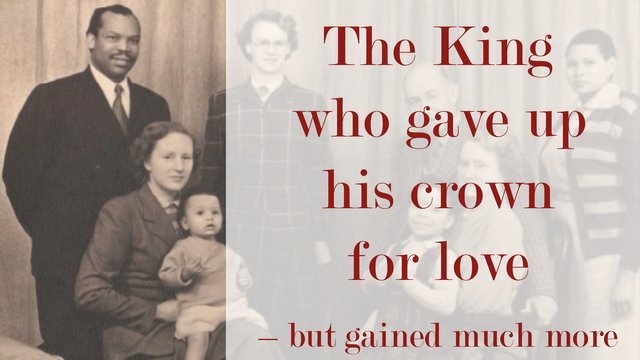
Thank you for participating in #freedomfriday! You can find your post in the Spread the Love Curation Report and we have sent 1 STEEM to @steembasicincome with your username in the memo. Thank you for your conscious contribution to this platform! Steem on! 🙏❤
Fantastic! Thanks :)
Congratulations! This post has been chosen as one of the daily Whistle Stops for The STEEM Engine!
You can see your post's place along the track here: The Daily Whistle Stops, Issue 294 (10/27/18)
For one thing mixed marriages produces a beautiful child for the most part.
Good point!
This love story is crafted of purest Win. <3
Totally. A triumph against all the odds.
Thanks for an interesting read!
Thanks @lymepoet - glad you enjoyed it!
I upvoted your post.
Keep steeming for a better tomorrow.
@Acknowledgement - God Bless
Posted using https://Steeming.com condenser site.